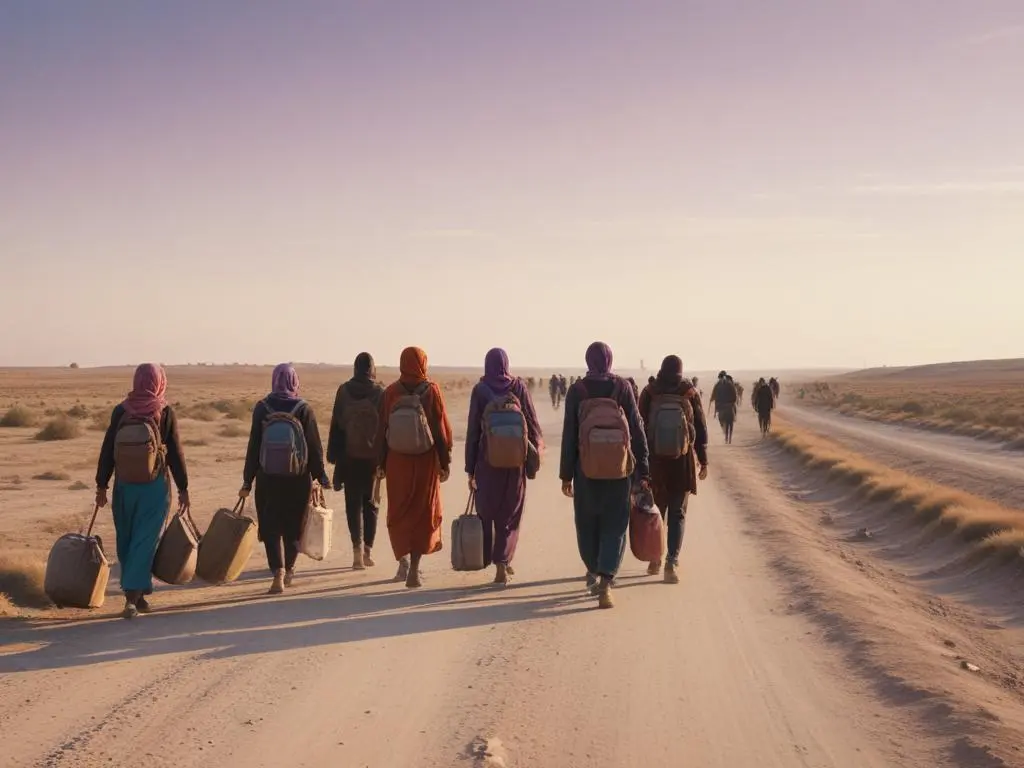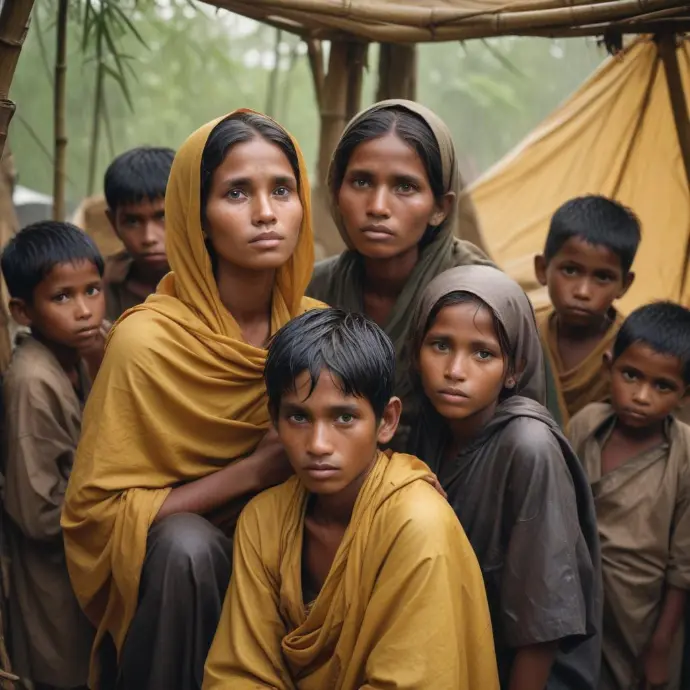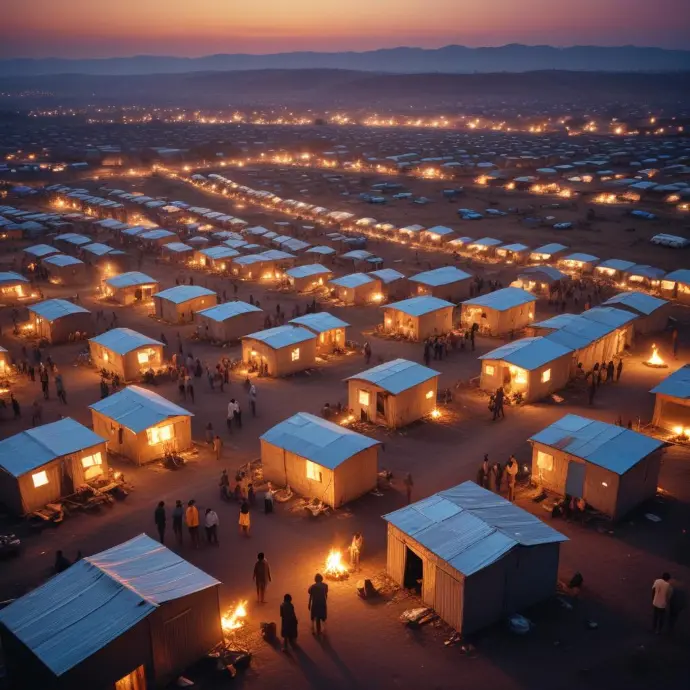Solidarity in Difficult Times: The Global Reaction to Large Refugee Flows
Return to the previous page and discover more information in this category
On our website, you can find a detailed study of the world's reaction to large refugee flows, a very relevant topic in the Refugees or Migrants section. Learn how the international community has addressed this challenge and how it has changed over time. Ready to embark on a full exploration and learn about the measures that have impacted the lives of millions of people!
Group of refugees walking at dusk with their belongings
The crisis of mass international refugee movements is a phenomenon that has reached unprecedented proportions in recent history. In 2024, the number of forcibly displaced people worldwide exceeded 120 million, marking a new historical record. This means that one in every 67 people on the planet has been forced to flee their homes. This represents an alarming increase compared to previous years. This phenomenon has been driven by armed conflict, persecution, violence, and massive human rights violations in various regions of the world, generating a humanitarian crisis of great magnitude.
Mass refugee movements not only represent a challenge for host countries and communities, but also raise questions about the capacity of the international system to provide an effective and coordinated response. This crisis highlights the urgent need for global solidarity and cooperation to address the underlying causes of forced displacement and ensure the protection and well-being of refugees.
Given this situation, it is essential to thoroughly analyze the scale of this humanitarian crisis and explore possible international responses to address it effectively.
The importance of solidarity in responding to mass refugee influxes is based on the need to foster a collaborative and harmonious approach among governments, international entities, non-governmental organizations, and the community. Solidarity is essential for developing comprehensive and sustainable responses that address humanitarian needs, safeguard basic rights, and facilitate the inclusion of refugees in their host communities.
Solidarity refers not only to providing humanitarian aid and physical resources, but also to a commitment to essential principles such as equity, justice, and respect for human dignity. Furthermore, it promotes global collaboration to address the root causes of forced displacement, such as armed conflict, persecution, and the lack of economic and social opportunities in countries of origin.
From this perspective, solidarity in responding to massive refugee flows is crucial to establishing a more equitable and compassionate international system that ensures the protection of the human rights of all people, regardless of their immigration status.
A comprehensive examination of the current refugee situation in the world reveals the complicated and serious nature of this humanitarian crisis. Currently, millions of people are displaced in various parts of the world, facing precarious conditions, vulnerability to violence, and violations of their basic rights.
Furthermore, the refugee situation is complicated by the lack of permanent solutions, the lack of resources for humanitarian aid, and discrimination and xenophobia in certain host countries. This underscores the urgent need to enhance global cooperation and take concrete steps to address the root causes of forced displacement, as well as to ensure the protection and well-being of refugees worldwide.
In this context, it is crucial that the international community intensify its efforts to provide an effective and coordinated response to the crisis of large refugee movements, focusing on solidarity, the defense of human rights, and respect for the dignity of all displaced persons.

Context of the Refugee Crisis
The refugee crisis around the world arises from a variety of complicated and diverse factors. Some of the main drivers include wars, political persecution, widespread violence, lack of economic opportunities, and social problems in various areas of the planet. As a result of these factors, millions of people have had to leave their homes in search of safety and refuge in other nations. Large refugee movements have become one of the most important global concerns, as they represent a major humanitarian emergency. Addressing this crisis requires a comprehensive and collaborative approach by the international community, as well as a careful analysis of the root causes and the specific needs of displaced groups. Understanding the origins of these large refugee movements is crucial in order to create effective plans that address the complex needs of these vulnerable communities.
Armed conflict is one of the main causes of forced displacement globally. According to the United Nations High Commissioner for Refugees (UNHCR), millions of people are forced to leave their homes due to violence and insecurity generated by armed conflict in different parts of the world. This forced displacement not only affects people's physical and psychological integrity but also entails significant challenges in terms of access to food, water, shelter, and medical care.
The impact of armed conflict on the displacement of people is devastating, as affected populations face the loss of their livelihoods, family separation, and exposure to situations of extreme vulnerability. The international response to these massive refugee movements must prioritize the urgent humanitarian needs and the protection of the fundamental rights of displaced people.
The refugee crisis generated by armed conflict requires coordinated and sustained action by the international community to mitigate human suffering and promote durable solutions for these displaced populations.
The figures related to the international refugee crisis are staggering and reveal the magnitude of this humanitarian situation. According to the UNHCR annual report, there are an estimated 47 million refugees worldwide, more than half of whom are under the age of 18. These figures reflect the urgent need for effective and coordinated responses to address the complex needs of this vulnerable population.
Furthermore, it is estimated that more than 69 million people are internally displaced due to conflict and persecution, highlighting the global dimension of this humanitarian crisis. These statistics underscore the importance of providing protection and assistance to displaced people, as well as promoting sustainable solutions that address the root causes of these massive refugee movements internationally.
The refugee crisis represents a significant challenge for the international community and requires a strong commitment to ensuring the protection of the human rights and dignity of displaced people worldwide.
International Response to Mass Refugee Movements
In response to the refugee crisis, various international organizations have implemented actions and programs to support displaced persons. The United Nations Refugee Agency (UNHCR) plays a fundamental role in providing humanitarian assistance, protection, and durable solutions for refugees worldwide. Through its field operations, UNHCR works closely with governments, NGOs, and other UN agencies to ensure that refugees receive the help they need.
Another key organization in the international response is the International Organization for Migration (IOM), which focuses on migration, human mobility, and humanitarian crisis management. The IOM assists refugees and internally displaced persons, offering reintegration programs, assistance with voluntary return, and psychosocial support.
In addition, the International Committee of the Red Cross (ICRC) deploys significant efforts to provide humanitarian assistance to populations affected by armed conflict and situations of violence. Through its protection, medical care, and family reunification support programs, the ICRC contributes to alleviating the suffering of refugees and displaced persons worldwide.
The international response to mass refugee movements requires close cooperation between countries. In this regard, agreements and collaborative mechanisms have been established to jointly address the crisis. The New York Declaration for Refugees and Migrants, adopted by the UN General Assembly in 2016, represents a global commitment to strengthen the protection of refugees and to more equitably share the responsibility for their reception and assistance.
Similarly, the European Union has promoted cooperation among its member states to address the refugee crisis, through the implementation of relocation and resettlement programs, as well as the strengthening of external borders to more effectively manage migratory flows.
Likewise, South-South cooperation, which involves developing countries hosting large numbers of refugees, plays a crucial role in the international response. This collaboration focuses on the exchange of good practices, financial support, and regional solidarity to address the challenges associated with the presence of refugees and internally displaced persons.
Despite the efforts made, the international response to refugee movements faces various challenges and obstacles. The lack of adequate funding for humanitarian programs, the reluctance of some countries to host refugees, xenophobia and stigmatization, as well as the logistical difficulties in providing assistance in conflict zones are just some of the challenges faced by international organizations and host countries.
Furthermore, the absence of a political solution to armed conflicts and crises that generate massive population displacement represents a fundamental obstacle to effectively addressing the refugee situation internationally. The lack of political will to resolve conflicts and promote peace contributes to the prolongation of humanitarian crises and hampers the search for durable solutions for refugees.
In this context, it is essential to promote a comprehensive approach that addresses not only the immediate needs of refugees but also the underlying causes of forced displacement, in order to achieve a more effective and sustainable international response to mass refugee movements.

Impact of Solidarity on the Protection of Refugee Rights
International solidarity towards refugees has had significant positive impacts on the lives of people forced to leave their homes due to conflict, persecution, or natural disasters. Solidarity not only provides immediate humanitarian aid but also contributes to the integration of refugees into host communities. This integration can include access to education, employment opportunities, and health services, giving refugees the opportunity to rebuild their lives in a safe and welcoming environment.
Furthermore, solidarity promotes a sense of belonging and empathy at the global level, leading to greater awareness of the root causes of forced displacement. This awareness can generate momentum to advocate for long-term solutions, such as conflict resolution, the protection of human rights, and sustainable development in affected regions. Solidarity in the lives of refugees not only provides them with material and emotional support but also gives them hope and the opportunity to regain dignity and stability amidst extremely difficult circumstances.
International solidarity plays a critical role in ensuring the human rights of refugees. By joining together in solidarity, countries and organizations can push for respect for fundamental principles of refugee protection, such as the principle of non-refoulement, which prohibits expelling or returning refugees to situations where their lives or freedoms are at risk.
Furthermore, international solidarity can generate coordinated efforts to address the specific needs of refugees, including protection from gender-based violence, family reunification, access to fair asylum procedures, and the removal of barriers that impede full integration into host communities.
Solidarity can also influence the creation and strengthening of legal and policy frameworks that protect refugee rights at the national and international levels, contributing to their long-term safety and well-being.
In the current context of mass refugee movements, exemplary experiences of solidarity have been observed at the global level. Examples of this include cooperation between governments to establish humanitarian corridors that allow for the safe transfer of refugees, collaboration between aid agencies to provide coordinated and sustained assistance, and the generosity of local communities that welcome refugees and help them integrate into their new realities.
Furthermore, solidarity is reflected in the work of human rights defenders and civil society organizations that tirelessly advocate for refugee protection, raise public awareness, and support initiatives for the inclusion and empowerment of displaced persons.
These exemplary experiences illustrate how solidarity can make a difference in the protection and well-being of refugees and serve as inspiration for future solidarity actions at the global level.

Pending Challenges and Future Perspectives
The refugee situation worldwide faces a series of risks and challenges that hinder their search for international protection. First, the lack of resources and capacity of host countries to meet refugees' basic needs represents a significant challenge. This translates into insufficient shelter, precarious health services, and limited employment opportunities, which negatively impacts the quality of life of refugees and their families. Furthermore, xenophobia and discrimination against refugees in some host countries pose a risk to their safety and well-being. Social stigma and lack of integration hinder their adaptation process and create barriers to accessing educational and employment opportunities. This situation increases the vulnerability of refugees, especially women and children. Furthermore, insecurity in refugees' countries of origin and transit, as well as violence, human trafficking, and exploitation, represent additional challenges in their search for international protection. These adverse conditions require effective and coordinated international responses to ensure the safety and well-being of refugees at all stages of their displacement.
In light of the challenges posed by mass refugee movements, various innovations and proposals have emerged with the aim of improving the international response to this humanitarian crisis. First, strengthening cooperation and coordination mechanisms between host countries and the international community is essential to ensure an effective and sustainable response.
Furthermore, the implementation of socioeconomic integration programs that promote the inclusion of refugees in host communities, as well as access to education, healthcare, and employment opportunities, represents a crucial measure to improve their quality of life and foster their self-reliance.
Furthermore, the development of innovative strategies for the reception and protection of refugees, including the use of new technologies to facilitate their registration, access to services, and communication with their loved ones, can significantly contribute to improving their situation and strengthening their resilience in the context of displacement.
Given the magnitude of the global refugee crisis, the importance of continued cooperation among States, international organizations, civil society, and the private sector is evident in addressing this situation effectively and sustainably. Collaboration in the provision of financial, humanitarian, and logistical resources is essential to ensure adequate protection and assistance to refugees at all stages of their displacement.
Furthermore, promoting policies and legal frameworks that guarantee the protection of refugees' human rights, as well as their inclusion and active participation in decisions that affect their lives, is essential to addressing this crisis in a comprehensive manner that respects the dignity and diversity of displaced persons.
In this regard, the continued cooperation and commitment of the international community are key to ensuring that the response to mass refugee movements is effective, fair, and consistent with the fundamental principles of solidarity and respect for human rights.
Conclusions
In recent decades, significant progress has been made in international solidarity in the face of the refugee crisis. The coordinated efforts of various organizations, governments, and humanitarian actors have made it possible to provide assistance to millions of displaced people, providing shelter, food, medical care, and psychosocial support.
Collaboration between countries and the creation of international legal frameworks have contributed to the protection of refugees' rights, establishing standards for their humane treatment and integration into new communities. Despite persistent challenges, international solidarity has demonstrated its capacity to respond effectively to refugee crises around the world.
It is important to emphasize that while significant progress has been made, much remains to be done. International solidarity must continue to be strengthened to ensure that no refugee is left behind and that all have access to decent and safe living conditions.
Maintaining a focus on the protection of refugee rights globally is crucial in a context where mass refugee movements continue to challenge the international community. Sustained attention to this issue is essential to ensure that refugees receive the necessary assistance, their fundamental rights are respected, and their integration into new communities is promoted in a dignified and safe manner.
Furthermore, maintaining a focus on the protection of refugee rights globally is essential to addressing the underlying causes of forced displacement, promoting sustainable solutions that seek to prevent further crises and protect people in vulnerable situations.
International cooperation, the sharing of best practices, and the strengthening of protection mechanisms are fundamental aspects in this regard. Only through continued and coordinated commitment can we ensure that refugee rights are respected and protected worldwide.
Continued commitment to defending the human rights of refugees and displaced persons is a responsibility that must be assumed by the international community as a whole. This commitment entails not only providing immediate humanitarian assistance but also working to create conditions that allow refugees to rebuild their lives in dignity and safety.
Defending the human rights of refugees and displaced persons also requires addressing the root causes of forced displacement, such as armed conflict, persecution, and climate change. Furthermore, it is essential to promote the inclusion of refugees in host societies, fostering equal rights and opportunities for all.
In this regard, the active participation of civil society, non-governmental organizations, and human rights defenders is essential to ensure that refugees receive the protection and support they deserve. Continued commitment to defending the human rights of refugees and displaced persons is a moral and legal imperative that must guide the actions of the international community now and in the future.
